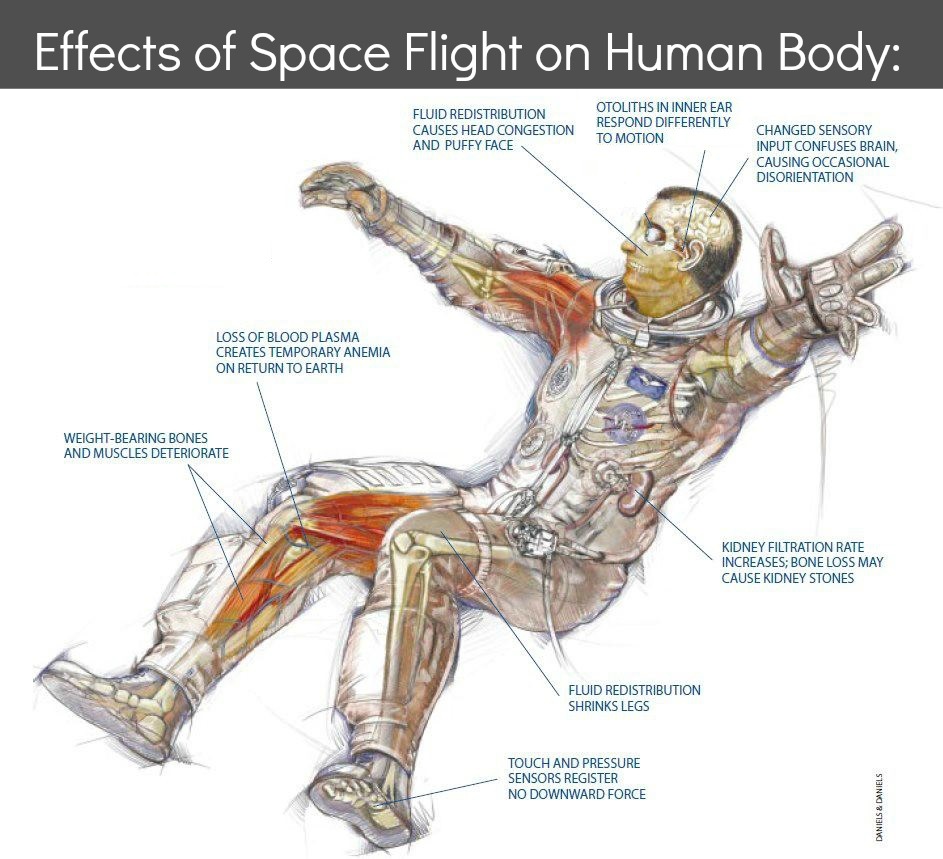

You’ve probably been told many, many times that everything in the cosmos is connected. As John Muir so eloquently put it, “When we try to pick out anything by itself, we find it hitched to everything else in the Universe.” But what does this mean, exactly? Today, I want to explore this statement by looking at how we are connected to our planet.
We obviously need the Earth for food, water, air, and all the other basic necessities, but what I really want to do is explore how we rely on this planet in ways that, perhaps, we’ve never even considered. And to me, it seems that the best way to explore our connectedness to the planet is to leave it behind…and take a short trip into space.
We all know that gravity is rather important. It keeps us all on the ground and stops us from constantly bumping into one another…but it does a lot more than that. On Earth, gravity helps to regulate our blood flow by pulling our fluids down towards our lower extremities. Of course, it doesn’t stay there (if it did, we would die). Our body works against gravity to ensure that blood is pumped to the rest of our vital systems. Ultimately, we are evolved to suit this gravitational environment, so it’s not surprising that things change in space. Because there is such low gravity in space, our bodily fluids are free to roam about as they please. This is known as “fluid shift.” It sounds a little horrifying, but the results are mild. Due to the increased amount of blood in the head, individuals sometimes get a stuffy nose and a puffy face…a space cold, if you will.
The impact on the muscles is a little more traumatic. On Earth, gravity helps keep us rather fit (assuming that we get out and walk every now and again). In fact, the simple act of standing works your muscles; at the very least, you are forced to carry your own weight. The gravitational pull that your body is forced to work against ultimately helps to keep your muscles from deteriorating. However, because you are weightless in space, it is rather easy to move your muscles. As a result, they don’t get a healthy workout. Muscles quickly weaken and lose their strength, which is why astronauts on the ISS have to work out for at least two hours each day to prevent muscle loss (see, being an astronaut isn’t all fun and games).

And unfortunately, the problems don’t stop here. In case you don’t know, we need our bones. Without them, we really wouldn’t get much accomplished. On Earth, just as gravity helps us maintain our muscle mass, the Earth’s pull puts stress on our skeletal system, which helps keep it sturdy. However, in space your bones don’t have to contend with Earth’s gravity during movement. As a result, progressive bone loss is a serious issue for long-term residents in space. After just 10 days of weightlessness, 3.2 percent of each bone’s calcium is lost. This can lead to fractures and, because bone loss leads to a rise in calcium levels in the blood, kidney stones.
Then there is Space-sickness. On Earth, our inner ears and eyes work together to tell us which way is up and which way is down. This helps us balance, and it helps us maintain coordination. In space, your eyes can obviously tell you what is up and what is down. However, your inner ears (specifically, your vestibular organs) rely on the downward pull of gravity to discern orientation. Thus, they are effectively useless in space. Although your eyes may tell your brain that you are upside-down, your brain does not receive any information from the organs located in your inner ears. As a result, individuals often become disoriented and nauseous. Really, it’s a lot like travel sickness. This disorientation often leads to vomiting and loss of appetite. Fortunately, the brain adjusts to these changes, and the side effects subside after a few days of weightlessness.

But really, this is just the tip of the iceberg. Weightlessness also impacts urine production by altering kidney functions, and a number of other bodily functions that we generally take for granted. The point? The universe is an exceedingly complex place, and noting all the ways in which things are connected is a monumental task. We know that the Earth’s gravity keeps us on the ground, but it also aids us in a number of different (and less obvious) ways. The example here – gravity – is extreme. But in truth, it is nearly impossible for us to know all the consequences of removing any one thing.
…a helpful thing to remember as the seasons change and the mosquitoes comes out in droves.